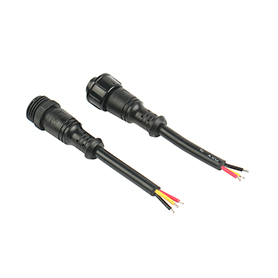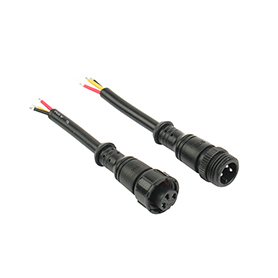News


News

Maintenance and Troubleshooting of IP68 waterproof connectors: A comprehensive guide
Release time:2024-11-25
viewed:612
In the field of modern technology and industry, IP68 waterproof connectors as a key component of electrical connections, its importance is self-evident. They not only have excellent water and dust resistance, but also maintain a stable electrical connection in harsh environments to ensure the normal operation of the equipment. However, in order to ensure the long-term performance and reliability of these connectors, regular maintenance and timely troubleshooting are essential.

1. Daily inspection: Ensure that the connector is intact and reliable
Daily inspection is the first step in maintaining IP68 waterproof connectors and the key to preventing failure. Here are the highlights of daily inspections:
Appearance inspection: Check the housing of the connector regularly to ensure that there are no cracks, deformation, or signs of corrosion. These signs may indicate that the connector has suffered physical damage or environmental erosion and requires further inspection or replacement. At the same time, check whether the fastening screws are loose or missing, and whether the seals are intact.
Connection status: Ensure connectors are properly installed and securely connected. Check that pins and jacks are fully inserted and are not loose or out of alignment. Loose or not fully inserted connectors can result in poor contact, which can affect electrical performance.
Environmental adaptability: Observe the environment around the connector to ensure that there is no standing water, dirt, or other factors that could affect its performance. Especially in humid or corrosive environments, checks should be carried out more frequently to ensure that the tightness and electrical performance of the connector are not affected.
2. Cleaning and maintenance: extend the service life of the connector
Cleaning and maintenance is another important part of maintaining IP68 waterproof connectors. The following are the precautions for cleaning and maintenance:
Clean the surface: Using a soft cloth or brush, gently remove dirt and dust from the connector surface. Avoid using corrosive cleaners or metal brushes to avoid damaging connector surfaces or seals.
Seal maintenance: Check the condition of the seal to ensure that it is not aged, damaged or deformed. If the seal has these problems, it should be replaced in time. Before installing new seals, ensure that the seals are kept dry and clean to avoid introducing contaminants during installation.
Lubrication treatment: For connectors that require lubrication, lubricate with a suitable lubricant. The lubricant can increase the smoothness of insertion and removal, reduce wear and friction, and thus extend the service life of the connector. However, it is important to note that not all connectors require lubrication. Therefore, before lubrication, be sure to consult the connector's manual or consult the manufacturer's recommendations.
3. Regular check and test: to ensure the stability of the connector performance
In addition to daily inspection and cleaning maintenance, IP68 waterproof connectors should also be inspected and tested regularly to ensure that their performance is stable and reliable. The following are the contents of regular inspections and tests:
Electrical performance test: Use professional testing instruments to test the electrical performance of the connector. Including insulation resistance, contact resistance, compressive strength and other indicators. These tests can help identify potential electrical faults and ensure that the electrical performance of the connector meets the design requirements.
Mechanical performance test: Check the connector insertion and withdrawal force, locking force and other mechanical performance indicators. These tests assess the mechanical properties and durability of the connector, ensuring that it does not become loose or damaged during long-term use.
Environmental adaptability test: Place the connector in a simulated harsh environment for testing, such as high temperature, low temperature, humidity, etc. These tests can evaluate the performance and stability of the connector under different environmental conditions, ensuring that it will work properly in practical applications.

Although the IP68 waterproof connector has excellent water and dust resistance, it may still fail during long-term use. The following are common connector failures and their causes:
1. Poor contact
Poor contact is one of the most common problems in connector failure. The main reasons include:
Needle or jack deformation: The needle or jack may be deformed by mechanical stress during insertion and removal, resulting in poor contact.
Corrosion or wear: When connectors are exposed to harsh environments for a long time, pins and jacks may be corroded or worn, affecting electrical connections.
Weak connection: If the connector is not properly installed or locked, it may result in poor contact. In addition, long-term vibration or shock may also cause the connector to loosen.
2. The seal fails
Seal failure is another common connector failure. The main reasons include:
Aging or damage of seals: Seals may age or be damaged during long-term use, resulting in reduced sealing performance.
Improper installation: If the seal is not properly installed or damaged during installation, the seal may fail.
Connector shell deformation or rupture: The connector shell may be deformed or broken under external impact or long-term stress, thus affecting the sealing performance.
3. Electrical performance decline
The decrease in electrical performance may be caused by oxidation, corrosion, or poor contact of the metal components inside the connector. In addition, aging or breakage of the connecting lines may also lead to decreased electrical performance.
4. Mechanical failure
Mechanical failure is usually caused by damage to the connector housing or internal parts. These damages may be caused by prolonged stress, vibration, shock or improper operation.

1. Diagnosis and location
When a fault occurs, observe and record the fault symptom. Then, according to the fault phenomenon, the preliminary diagnosis is made to determine the possible cause of the fault. Using professional testing instruments and tools, the connector is tested and inspected in detail to accurately locate the fault point. During the diagnosis process, pay attention to the following points:
Careful observation: Observe the appearance of the connector, the state of the pins and jacks, and the condition of the seals. Look for obvious signs of physical damage or corrosion.
Detailed record: Record fault symptoms, test data, and inspection results. This information is important for subsequent analysis and troubleshooting.
Comprehensive analysis: Combined with fault phenomena, test data and inspection results, comprehensive analysis. Determine the fault point and develop the corresponding troubleshooting plan.
2. Repair and replace
Repair or replace damaged parts according to the diagnosis. The following are precautions for repair and replacement:
Replacement parts: If the parts inside the connector are badly damaged and cannot be repaired, new parts need to be replaced. Make sure the replacement part has the same specifications and performance as the original part. Always consult the connector's manual or consult the manufacturer's recommendations before replacing the part.
Check the tightness: After replacing the part, you need to check the tightness of the connector. Make sure the seals are properly installed and fit tightly. If the seal is poor, you need to readjust or replace the seal.
Functional testing and performance verification: After repairing or replacing parts, functional testing and performance verification are required. Make sure the connector is working properly and meets the design requirements. The test contents include electrical performance test, mechanical performance test and environmental adaptability test.
3. Preventive measures
In order to prevent the failure of IP68 waterproof connectors, the following precautions can be taken:
Regular inspection and maintenance: Check and maintain connectors regularly to discover and handle potential problems in a timely manner. Develop a detailed maintenance plan and process to ensure long-term stability and reliability of connectors.
Use proper tools and methods: Use proper tools and methods when inserting and removing connectors. Avoid using force or improper operation to damage or loosen the connector.
Storage and transportation precautions: During storage and transportation, pay attention to protecting connectors from adverse factors such as vibration, shock and moisture. Use appropriate packaging materials and protective measures to ensure the safety and integrity of connectors.
Train operators: Train and educate operators to improve their operational skills and safety awareness. Ensure that they understand the use of connectors and precautions, and can operate and maintain them correctly.
As a key component of electrical connections, IP68 waterproof connectors play an important role in modern technology and industry. To ensure its long-term performance and reliability, regular maintenance and timely troubleshooting are essential. The above content provides detailed maintenance guidelines and troubleshooting methods, hoping to help you better understand and maintain IP68 waterproof connectors.